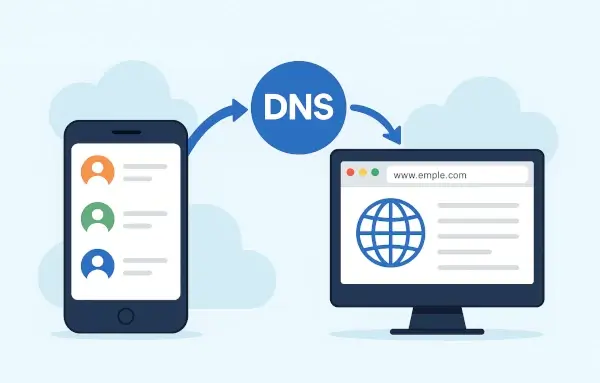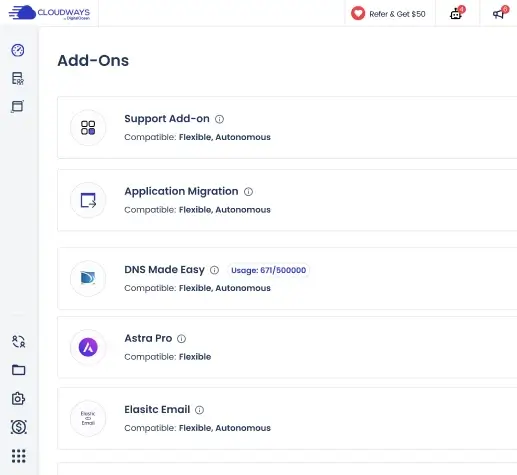
Have you ever launched a website, made a DNS change, and then waited and waited some more for it to go live? You are not alone.
Table of Contents:
What is DNS and Why Does It Matter?
How DNS Affects Website Speed
Benefits of Fast DNS Resolution
Security Enhancements with DNS Services
Ideal Use Cases for DNS Management
Key Features of DNS Made Easy
Final Thoughts
DNS management isn't exactly the first thing most of us think about when building or running a website. In fact, it usually gets pushed to the side until something goes wrong or things start feeling a bit slow.
However, how we handle DNS is starting to shift, and this change can make a real difference.
This guide will simplify everything you need to know about DNS, from what it does behind the scenes to how the right DNS setup can shave seconds off your load times.
You will also discover how tools like DNS lookup and DNS Made Easy can take the guesswork out of managing your domain settings and help you create a faster, more reliable website experience.
Let's get into it.
What is DNS and Why Does It Matter?
DNS stands for Domain Name System. It may sound technical, but its job is simple. It connects the domain names we type into a browser with the actual servers where websites live.
You may think of it like your phone's contact list. Instead of remembering everyone's number, you tap their name.
DNS does the same thing. It takes a user's request for a domain and tells their browser exactly where to go.

Now here is where things get interesting. The faster this lookup happens, the quicker your site loads. The slower it is, the longer your visitors wait. And in online business, even a few seconds of delay can mean lost traffic, conversions, and trust.
DNS may seem like a behind-the-scenes player, but it sets the tone for your entire site experience.
How DNS Affects Website Speed
Let's say your website is optimized. You have а great hosting, compressed images, fast scripts, and a smart caching setup. But the moment someone types your domain into their browser, the first thing that happens is a DNS lookup.
If that lookup takes too long, everything else gets delayed. That one small step affects your time to first byte, page load speed, and ultimately your bounce rate.
Here is how it plays out:
- Your visitor types in your domain
- Their browser asks for the IP address
- The DNS resolver fetches it
- Then, finally, your site starts loading
That tiny step right there can take milliseconds or seconds. And seconds make all the difference. A slow DNS setup quietly chips away at user satisfaction, while a fast DNS setup creates the kind of seamless experience that keeps people coming back.
When your DNS is fast, your site feels faster, loads faster, and performs better overall. Every site owner should care about this.
Benefits of Fast DNS Resolution

There is a lot of talk about fast load times and reduced bounce rates. But what does fast DNS resolution actually do for your website? Here are some real-world benefits:
Better User Experience
The faster your site loads, the smoother it feels. DNS resolution is the very first step in that chain. Fast lookups mean faster first impressions.
Improved Search Engine Rankings
Page speed is a known SEO ranking factor. While DNS is just one part of the puzzle, it is a part you can control with the right tools. A faster DNS resolution time helps keep your overall load speed in check.
Fewer Support Tickets
When DNS records propagate instantly and changes are reflected without delay, you are less likely to receive the classic "It's not showing up yet" messages from clients or teammates.
Seamless Multi-Domain Management
Managing multiple websites? Fast, centralized DNS management allows you to move quickly, especially when handling client sites or campaign-specific landing pages.
Security Enhancements with DNS Services

Performance is only one side of the coin. The other is security, and DNS plays a bigger role here than most people realize.
DDoS Protection
Some premium DNS services include built-in defenses against Distributed Denial of Service attacks that aim to flood your DNS servers. While not a replacement for full-scale DDoS mitigation, it adds a strong first layer.
Redundant Infrastructure
Cloud-based DNS solutions operate across multiple servers and data centers, reducing the risk of a single point of failure taking your site offline.
DNS Record Controls
Managing DNS in a secure, structured interface means fewer chances of misconfigurations. Mistyped records and forgotten TTLs are easy to spot and fix before they cause issues.
Ideal Use Cases for DNS Management

Let's highlight the best scenarios for leveraging DNS management. Discover when it most boosts performance and reliability.
E-commerce Sites
When downtime or delays directly impact revenue, every second counts. Fast DNS helps customers get to product pages quicker and keeps checkout flows snappy.
Agencies with Multiple Clients
If you manage multiple domains or websites, centralizing DNS reduces headaches and saves time. Add, configure, and monitor everything from one dashboard.
Marketing Campaigns and Landing Pages
Launching a new product? Running an email campaign? Set up a dedicated domain and point it to your landing page within minutes. No delays, no guessing.
Blogs and Content Sites
Keep your content fast and accessible by ensuring the first request to your domain is lightning quick.
Key Features of DNS Made Easy
Managing DNS should not feel like solving a puzzle without all the pieces. It can be simple, reliable, and even a little satisfying with the right tools.
That is exactly what platforms like DNS Made Easy by Cloudways aim to deliver. Let's look at some of the features that make DNS management easier.

1. Instant Propagation
This one is a game-changer. With most free DNS services, any change you make takes hours to reflect. That means you are stuck waiting and refreshing while your updates slowly make their way across the internet.
2. Faster TTLs
TTLs, or Time To Live settings, tell other DNS servers how long it takes to cache your data. Shorter TTLs mean faster updates. They also help speed up initial visitor load times since the DNS information is always fresh and ready to go.
3. ANAME Records
CNAMEs are great, but they usually cannot be used at the root level of your domain. That is where ANAME records come in. They bring the flexibility of a CNAME to your main domain, making setups smoother and performance better.
4. 100% Uptime
If your DNS is down, your website is invisible. That is why the reliability of your DNS provider matters. DNS Made Easy is built on fault-tolerant infrastructure and has maintained a perfect uptime record in recent years.
5. Simple Dashboard Configuration
Managing your records, adding domains, or setting up email integrations should not feel like a tech support call. DNS Made Easy is designed for ease of use, and everything is right where you expect it to be.
6. DNS Traffic Insights
Want to know how your domains are performing or how many queries you are handling? Built-in analytics give you a bird's eye view of your DNS traffic to make smart, data-backed decisions.
Final Thoughts
DNS might not be the flashiest part of your website setup, but it is one of the most important. When managed well, it becomes invisible, in the best way. There are no delays, no downtime, just performance that works.
If you are building for speed, reliability, and long-term growth, it is time to give your DNS the attention it deserves.


 Copyright 2000-2025, WebSitePulse. All rights reserved.
Copyright 2000-2025, WebSitePulse. All rights reserved.